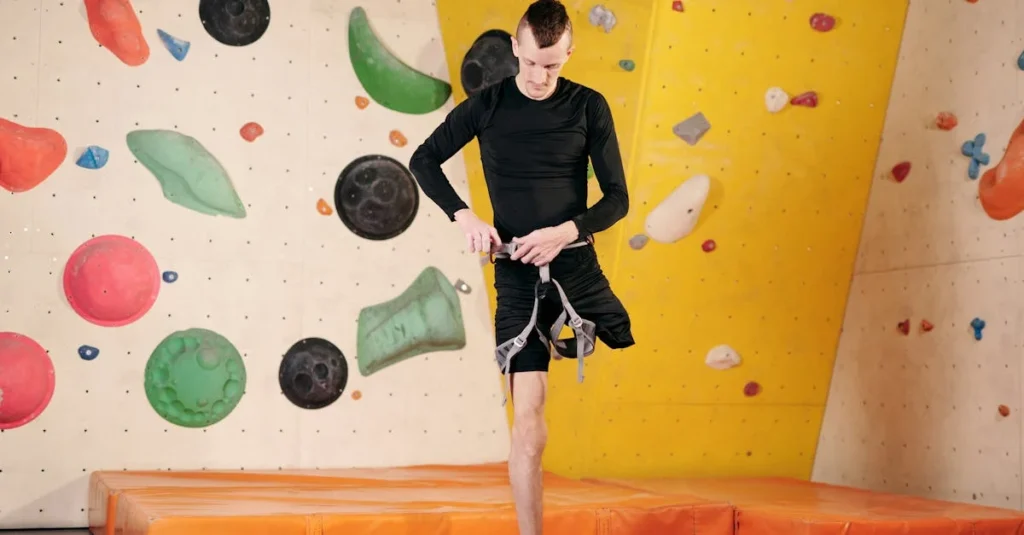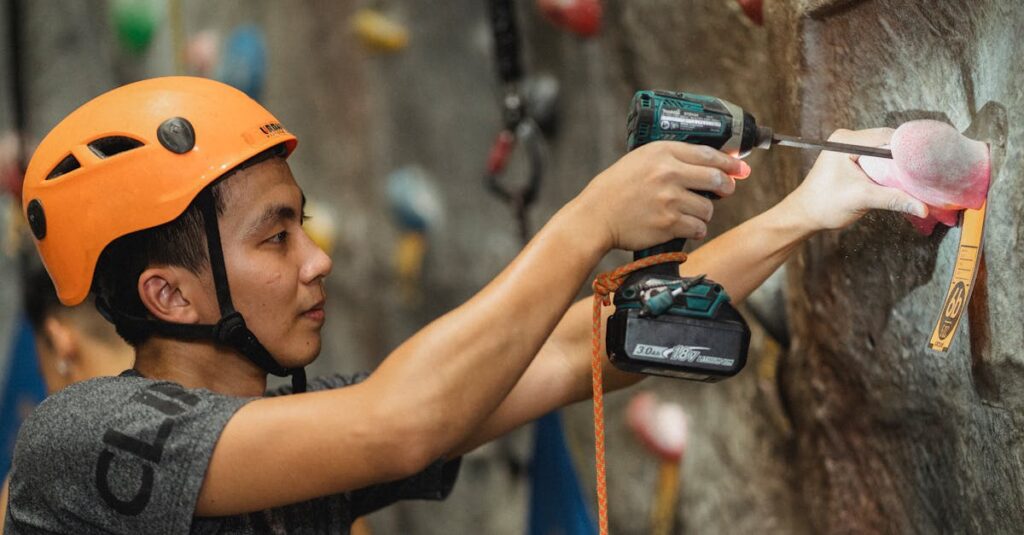In a world where couch-sitting can feel like an Olympic sport, the Bachelor of Exercise and Sport Science emerges as the ultimate game changer. This degree isn’t just about flexing muscles; it’s about understanding the science behind athletic performance and human movement. Imagine diving deep into the mechanics of how to turn everyday folks into fitness warriors while also having a blast studying the latest trends in sports and exercise.
With a mix of cutting-edge research and practical application, graduates find themselves at the forefront of a booming industry. Whether it’s coaching elite athletes, designing fitness programs for the average Joe, or even tackling the mysteries of sports psychology, this degree opens doors to a world where passion meets profession. So, if you’ve ever dreamt of making a living while helping others break a sweat, this might just be your golden ticket.
Bachelor Of Exercise And Sport Science
The Bachelor of Exercise and Sport Science degree emphasizes the scientific aspects of physical activity and wellness. This program integrates theoretical knowledge with hands-on experiences, ensuring that students grasp essential concepts of biomechanics, physiology, and kinesiology. Graduates emerge prepared for diverse roles in the fitness industry, equipped with the skills to optimize athletic performance and promote healthy lifestyles.
Curriculums often include courses in exercise prescription, sports nutrition, and motor learning. These subjects reinforce the comprehensive understanding needed to develop effective training programs for individuals and teams. Students learn to evaluate fitness levels, create tailored exercise regimens, and monitor progress systematically.
Laboratory experiences complement classroom learning, bridging theory with real-world application. Many programs encourage internships, providing direct exposure to professional environments. Networking opportunities often arise during these practical experiences, aiding students in finding employment post-graduation.
Career pathways for graduates are varied and include positions such as fitness coaches, exercise physiologists, and sports psychologists. Those who excel in research may also pursue advanced degrees, focusing on specialized areas like exercise physiology or sports management.
The growing interest in fitness and wellness continues to fuel demand for knowledgeable professionals in this field. Individuals passionate about exercise find fulfilling careers that contribute significantly to community health and athletic success. This degree serves as a foundation for those dedicated to making an impact through sport and exercise science.
Core Subjects In The Curriculum
The Bachelor of Exercise and Sport Science degree features a diverse curriculum that includes essential subjects for understanding human movement and athletic performance.
Anatomy And Physiology
Anatomy and physiology form foundational components of the curriculum. The study of anatomy covers the structure of the human body, including muscles, bones, and organs. Students explore how these components interact during physical activity. Understanding physiology complements this knowledge by focusing on bodily functions during exercise. Learners gain insights into energy systems, cardiovascular responses, and recovery processes. Such knowledge is crucial for developing effective training programs tailored to individual needs.
Exercise Physiology
Exercise physiology delves into the body’s responses to various forms of exercise. This subject examines adaptations that occur with different training regimens, highlighting the importance of specific intensity and duration. Students analyze factors that influence performance, such as nutrition and environment. Theoretical knowledge is supported by practical applications, including laboratory testing and data analysis. Course participants assess fitness levels and create evidence-based exercise prescriptions to optimize performance and health outcomes.
Sports Psychology
Sports psychology provides vital insights into the mental aspects of athletic performance. This subject explores motivation, concentration, and confidence in athletes. Strategies for mental skills training are discussed, helping individuals enhance their performance under pressure. Understanding group dynamics and team cohesion plays an essential role as well. Students learn to recognize psychological barriers that athletes may face, equipping them to implement effective support strategies. This knowledge enhances overall athlete development and contributes to successful coaching practices.
Career Opportunities After Graduation
Graduates with a Bachelor of Exercise and Sport Science find diverse career options that capitalize on their specialized knowledge and skills. This degree opens doors in coaching, sports management, and health and wellness sectors.
Coaching And Training
Coaching and training roles offer significant opportunities for graduates. Fitness coaches work with individuals to create personalized training regimens that meet specific goals. Personal trainers often focus on one-on-one sessions, emphasizing proper techniques and motivation. Sports coaches, meanwhile, guide teams in enhancing both skills and strategies. Positions in specialized training for athletes help optimize performance and achievement in competitive environments. Successful graduates excel by implementing evidence-based methods and fostering relationships with clients.
Sports Management
In the realm of sports management, graduates can pursue careers that oversee operations in various athletic organizations. Event coordinators plan and execute sports events, requiring excellent organizational abilities. Marketing professionals within sports companies focus on promoting teams, products, and initiatives to attract audiences. Additionally, facility managers ensure that sports venues run smoothly. Those prepared to enter this field utilize their understanding of industry dynamics and the importance of customer engagement.
Health And Wellness
The health and wellness sector provides another fruitful career path for graduates. Exercise physiologists assess and improve individuals’ physical fitness and health, often working in rehabilitation settings. Wellness coaches guide clients towards healthier lifestyles through motivation and educational programs. Community fitness coordinators design initiatives that promote physical activity within local populations. These roles leverage the skills developed during the degree to enhance public health and overall well-being in varied settings.
Benefits Of Pursuing This Degree
Pursuing a Bachelor of Exercise and Sport Science offers numerous advantages that enhance career prospects in the fitness industry.
Knowledge And Skills Development
Graduates gain a well-rounded understanding of the human body and its responses to exercise. They learn critical concepts in biomechanics, physiology, and kinesiology, which facilitate effective training program development. Essential skills also include exercise prescription and sports nutrition, enabling graduates to create personalized fitness plans. Practical experiences, such as laboratory testing and internships, reinforce theoretical knowledge and improve technical abilities. Graduates acquire practical insights into motor learning, preparing them to assess and evaluate fitness levels comprehensively. Ultimately, this degree equips individuals with the expertise necessary to excel in diverse roles within the fitness and sports sector.
Networking Opportunities
Building a professional network becomes a key component of the educational journey in this degree program. Students connect with industry experts during internships, workshops, and guest lectures. Collaborating with peers enhances teamwork abilities while establishing lasting relationships with fellow future professionals. Networking often leads to job opportunities in coaching, sports management, and wellness sectors. Mentorship from faculty and industry professionals further enriches the learning experience, providing valuable career guidance. Graduates leave the program with not only strong knowledge but also a network that supports their professional growth in the competitive fitness field.
Challenges In The Field
Graduates of a Bachelor of Exercise and Sport Science face several challenges in their career paths. Navigating industry expectations and advancements requires ongoing adaptation and skill enhancement.
Industry Competition
Competition for jobs in the fitness and sports sectors is intense. Many candidates possess similar educational backgrounds, making it crucial for graduates to differentiate themselves. Specialized certifications and unique skill sets, such as sports nutrition or rehabilitation techniques, enhance employability. Networking also plays a vital role in securing positions, as many opportunities arise through connections within the industry. Staying connected with professionals in sports organizations and fitness communities increases visibility in the job market.
Staying Updated With Research
Staying informed about the latest exercise science research poses another challenge. New findings frequently emerge, impacting training methods and health practices. Graduates must commit to continued education, attending conferences, and subscribing to relevant journals. Online platforms offer various resources for enhancing knowledge, but sifting through information demands discernment. Balancing a busy career with the need for ongoing learning requires effective time management and prioritization. Engaging in professional associations supports this learning through workshops and networking events.
Fitness and sports industry
The Bachelor of Exercise and Sport Science degree stands as a powerful gateway for those eager to make a mark in the fitness and sports industry. With a robust curriculum that combines theoretical knowledge and practical experiences, graduates are well-equipped to tackle the challenges of various roles. The diverse career options available ensure that individuals can find their niche, whether in coaching, sports management, or health and wellness.
As the demand for skilled professionals continues to rise, this degree not only offers valuable insights into human movement but also fosters essential networking opportunities. Graduates are poised to lead the way in promoting active lifestyles and enhancing athletic performance, making a significant impact on community health and well-being.



